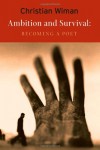Currently reading
The Discarded Image: An Introduction to Medieval and Renaissance Literature (Canto)
Boys and Girls Learn Differently!: A Guide for Teachers and Parents
Ambition and Survival: Becoming a Poet
Deep River: The Life and Music of Robert Shaw
Daring, Trusting Spirit
The Vatican Diaries: A Behind-the-Scenes Look at the Power, Personalities, and Politics at the Heart of the Catholic Church
The Whisperers: Private Life in Stalin's Russia
The Mysterious Benedict Society
 This book was rather like a poorer combination of "When The Tripods Came" and Madeline L'Engle's "A Wrinkle in Time". This book had slightly more humor but a very similar plot.
This book was rather like a poorer combination of "When The Tripods Came" and Madeline L'Engle's "A Wrinkle in Time". This book had slightly more humor but a very similar plot.
Imagine: How Creativity Works
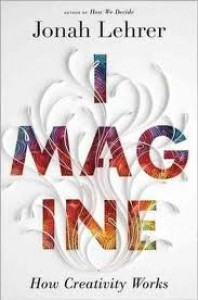 I just got this from the library. I'm not sure why I made a request for it, but as soon as I got it I read an article about the author from July 2012. Jonah Lehrer made up quotes from Bob Dylan in his book, was found out, and then continued to lie about them until forced to admit that he had lied. Publication of "Imagine" was halted, and Mr. Lehrer resigned his position as a staff writer at the "New Yorker" magazine. See http://www.guardian.co.uk/media/us-news-blog/2012/jul/30/jonah-lehrer-quits-new-yorker and http://www.npr.org/blogs/thetwo-way/2012/07/30/157605459/jonah-lehrer-resigns-from-new-yorker-admitting-he-made-up-quotes .As a result, it makes me very unwilling to read the rest of this book. How do I know which other bits he has made up or altered to support his premise? I could not find any explanation from the author for why he made up the quotes from Dylan. As it is, I continue to be interested in the topic of the science of creativity, but I will be looking for information elsewhere.
I just got this from the library. I'm not sure why I made a request for it, but as soon as I got it I read an article about the author from July 2012. Jonah Lehrer made up quotes from Bob Dylan in his book, was found out, and then continued to lie about them until forced to admit that he had lied. Publication of "Imagine" was halted, and Mr. Lehrer resigned his position as a staff writer at the "New Yorker" magazine. See http://www.guardian.co.uk/media/us-news-blog/2012/jul/30/jonah-lehrer-quits-new-yorker and http://www.npr.org/blogs/thetwo-way/2012/07/30/157605459/jonah-lehrer-resigns-from-new-yorker-admitting-he-made-up-quotes .As a result, it makes me very unwilling to read the rest of this book. How do I know which other bits he has made up or altered to support his premise? I could not find any explanation from the author for why he made up the quotes from Dylan. As it is, I continue to be interested in the topic of the science of creativity, but I will be looking for information elsewhere.
A Case for Solomon: Bobby Dunbar and the Kidnapping That Haunted a Nation
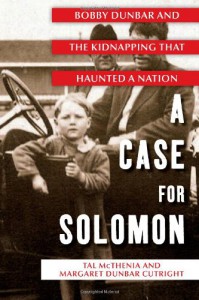 What happens when you make a mistake? What happens when you recognize that you've made a mistake? Do you own up to it? Or do you forge ahead and "will" yourself to believe that you didn't make a mistake? What happens to those around you as a result? What happens to your soul and heart? Do they expand in health and love? Or do they shrivel and shrink?When Bobby Dunbar's son, Bobby Jr. confronted his father one day, he asked him, "Who are you? Do do you THINK you are?". Bobby Sr. answered "I know who I am, and I know who you are, and that's all that matters. It's how we live our life." Those words were said by a grown man who had struggled his entire life to know who he really was. He was raise believing he was Bobby Dunbar, oldest son of Lessie and Percy Dunbar. But in reality, his parents had made a mistake. He was really Bruce Anderson, son of Julia Anderson. And Bobby's words "it's how we live our life" are an appropriate lens through which to view those lives around his.I don't know if you grew up hearing stories about family all the time, by in our family they are part of every get-together and every visit. Adults sitting around the table in the evening talking of family while the children are tired and ready for bed. Hearing snippets of family stories while playing on the porch or climbing trees. This story has a familiar feel to it, even though I had never heard of Bobby Dunbar until I read this book. The author, Bobby Dunbar's granddaughter Margaret Dunbar Cutright, tells the story well and with honesty. It no doubt was a hard story to tell. In 1912, four year old Bobby Dunbar disappeared in the swamps just north of Opelousas, Louisiana. Search parties were sent out, circulars were printed with his picture and a description of him. Months were spent following up leads and searching everywhere for Bobby. Lessie Dunbar, Bobby's mother, was almost insane with grief and "not knowing". As a result of her preoccupation with the missing Bobby, her youngest son Alonzo "forgot her" when she was gone from home for over a month and then finally went back home to him. Her husband, Percy, was quoted as saying that he needed to find the boy to restore his wife's sanity and to make it possible for him to live with her again. After 8 months of searching, a young boy matching the description of Bobby was found with a traveling tinker, William Cantwell Walters. Walters said that the boy was Bruce Anderson, son of Julia Anderson. When Lessie Dunbar initially saw the young boy, there was no recognition between them. Lessie thought that the boys eyes were not quite as her Bobby's had been. But eventually the need to have a boy home again seemed to overshadow life without Bobby, so Lessie and Percy declared this boy their son. From that point the boy was put in the Dunbar's care, and was never removed, even though concerns about the true identity of the boy were raised immediately. Julia Anderson had a very hard life. Married young, she was forced to flee an abusive marriage and then endure the death of her first baby. Eventually she had two other children by two other men as she worked in town and then with various families. Bruce was born the son of a traveling shoe salesman whom she never saw after the birth of her son. Bernice was born the daughter of Bunt Walters, son of the Walters family whom Julia worked for. When William Cantwell Walters, Bunt's brother, offered to take 3 year old Bruce to visit some of his sisters, Julia allowed him to take the boy on a trip. It is likely that Walters believed that Bruce was his nephew, fathered by his brother Bunt just like Bernice. Julia knew Bruce's real father, but did not contradict Walters thoughts about who his father really was. So when Walters took Bruce, it was likely that he was trying to find a better living situation for his nephew. Bad winter weather and Julia moving to work at different farms meant that Walters kept the boy for over a year. When Walters was arrested for kidnapping Bobby Dunbar, Julia wrote to tell the authorities that the boy with Walters was her son Bruce Anderson. But by then the Dunbar's had returned to Opelousas with Bobby, and the community in Opelousas rallied around them and supported them in keeping Bobby. When Julia Anderson initially saw the boy, almost a year and a half after Walters had taken him, there also was no recognition between them. But unlike the Dunbar's, she was not allowed weeks with the boy to re-establish a relationship. The Dunbar's had been teaching Bobby little "tricks" he used to do, and mannerisms that he had had before he left. They had even been telling him what had happened to him. During the year long trial of William Cantwell Walters for kidnapping, many Mississippi citizens came to Louisiana to testify on behalf of Walters and also for Julia Anderson. But the trial was held in Opelousas, the home-town of the Dunbar's. Lawyers came to the case not looking for justice, but for a way to prove others were lying when they said the boy was Bruce Anderson. Julia Anderson and the Mississippi witnesses didn't have a fair chance. Eventually Walters was convicted of kidnapping, not on strong evidence, but because if the boy WAS Bobby Dunbar (and he had to be) then Walters could only have gotten him by kidnapping him. The identity of the boy was never properly investigated. Walters escaped hanging only because the governor of Louisiana overturned his conviction on a technicality. It seems that Walters was never formally charged of kidnapping, and so he was released a free man. But Bobby remained with the Dunbar's.So what was the result for the two families? For the Dunbar's, Percy seemed never to be able to return to live with Lessie in peace. He began an affair with Altrice A. McCoullough of Florida in 1920. Lessie sued for divorce when she discovered evidence of his infidelity. The ugly battle between the two alienated Bobby and Alonzo from both of their parents, as Lessie grew more and more bitter and as Percy withdrew into anger. They formally divorced in 1927 and Lessie moved to Virginia, tired of living under the scrutiny of the Opelousas community who had helped her claim and keep Bobby. Evidently voices within the community that disagreed that Bobby was really Bobby Dunbar made life unbearable for her. Lessie lived in Virginia, away from Bobby and Alonzo. After the boys married and had their own families, they tried to integrate Lessie into their families. But neither family could bear Lessie living with them. In fact Bobby's wife Marjorie said "her or me" when Lessie stayed with Bobby's family for several weeks. Lessie's grandchildren did not ever really know her, and have no memories of love or kindness from her. For Julia Anderson, she placed her daughter Bernice for adoption. She later married Ollie Rawls and had seven children with him. After her public humiliation about her earlier relationships and accusations of her poor motherhood, Julia swore to care for and nurture her children. She succeeded, and eventually became a pillar in the community, helping those who were ill or old. Her children and grandchildren remember her with love for the kindness and stability she provided for them. But they always knew they had an older brother, Bruce, who had been taken away from their mother when he was only 4 years old. Julia knew that Bruce was really her son, but it is possible that she decided not to continue to fight for him in the face of a unified community and in the face of the Dunbar family. She wanted Bruce to have an intact personality, and she knew that continued fighting would make him only more splintered in himself. So she backed away, for Bruce's sake.And what of Bobby himself? It seems he struggled with his own memories. He had been told Walters beat him cruelly, but his memories were only of an old man who treated him with affection. How to reconcile what he knew with what he had been told? Bobby eventually seemed to understand that his parents had made a mistake and that he really was Bruce Anderson. After Percy's death he traveled to Mississippi and even met with two of Julia's children, his half-brother and half-sister. They did not realize the importance of his visit at the time, but in retrospect they realized he had "come back" to see the family that he had been taken away from. Bobby married and had a family that he devoted himself to. He provided them with the love and stability that he had not had growing up. Decades after Bobby died, his son Bobby Jr. agreed to have a DNA test alongside his cousin, David Dunbar. The DNA test revealed that the two men, who had grown up as cousins, were not related. Bobby Dunbar was really Bruce Anderson.
What happens when you make a mistake? What happens when you recognize that you've made a mistake? Do you own up to it? Or do you forge ahead and "will" yourself to believe that you didn't make a mistake? What happens to those around you as a result? What happens to your soul and heart? Do they expand in health and love? Or do they shrivel and shrink?When Bobby Dunbar's son, Bobby Jr. confronted his father one day, he asked him, "Who are you? Do do you THINK you are?". Bobby Sr. answered "I know who I am, and I know who you are, and that's all that matters. It's how we live our life." Those words were said by a grown man who had struggled his entire life to know who he really was. He was raise believing he was Bobby Dunbar, oldest son of Lessie and Percy Dunbar. But in reality, his parents had made a mistake. He was really Bruce Anderson, son of Julia Anderson. And Bobby's words "it's how we live our life" are an appropriate lens through which to view those lives around his.I don't know if you grew up hearing stories about family all the time, by in our family they are part of every get-together and every visit. Adults sitting around the table in the evening talking of family while the children are tired and ready for bed. Hearing snippets of family stories while playing on the porch or climbing trees. This story has a familiar feel to it, even though I had never heard of Bobby Dunbar until I read this book. The author, Bobby Dunbar's granddaughter Margaret Dunbar Cutright, tells the story well and with honesty. It no doubt was a hard story to tell. In 1912, four year old Bobby Dunbar disappeared in the swamps just north of Opelousas, Louisiana. Search parties were sent out, circulars were printed with his picture and a description of him. Months were spent following up leads and searching everywhere for Bobby. Lessie Dunbar, Bobby's mother, was almost insane with grief and "not knowing". As a result of her preoccupation with the missing Bobby, her youngest son Alonzo "forgot her" when she was gone from home for over a month and then finally went back home to him. Her husband, Percy, was quoted as saying that he needed to find the boy to restore his wife's sanity and to make it possible for him to live with her again. After 8 months of searching, a young boy matching the description of Bobby was found with a traveling tinker, William Cantwell Walters. Walters said that the boy was Bruce Anderson, son of Julia Anderson. When Lessie Dunbar initially saw the young boy, there was no recognition between them. Lessie thought that the boys eyes were not quite as her Bobby's had been. But eventually the need to have a boy home again seemed to overshadow life without Bobby, so Lessie and Percy declared this boy their son. From that point the boy was put in the Dunbar's care, and was never removed, even though concerns about the true identity of the boy were raised immediately. Julia Anderson had a very hard life. Married young, she was forced to flee an abusive marriage and then endure the death of her first baby. Eventually she had two other children by two other men as she worked in town and then with various families. Bruce was born the son of a traveling shoe salesman whom she never saw after the birth of her son. Bernice was born the daughter of Bunt Walters, son of the Walters family whom Julia worked for. When William Cantwell Walters, Bunt's brother, offered to take 3 year old Bruce to visit some of his sisters, Julia allowed him to take the boy on a trip. It is likely that Walters believed that Bruce was his nephew, fathered by his brother Bunt just like Bernice. Julia knew Bruce's real father, but did not contradict Walters thoughts about who his father really was. So when Walters took Bruce, it was likely that he was trying to find a better living situation for his nephew. Bad winter weather and Julia moving to work at different farms meant that Walters kept the boy for over a year. When Walters was arrested for kidnapping Bobby Dunbar, Julia wrote to tell the authorities that the boy with Walters was her son Bruce Anderson. But by then the Dunbar's had returned to Opelousas with Bobby, and the community in Opelousas rallied around them and supported them in keeping Bobby. When Julia Anderson initially saw the boy, almost a year and a half after Walters had taken him, there also was no recognition between them. But unlike the Dunbar's, she was not allowed weeks with the boy to re-establish a relationship. The Dunbar's had been teaching Bobby little "tricks" he used to do, and mannerisms that he had had before he left. They had even been telling him what had happened to him. During the year long trial of William Cantwell Walters for kidnapping, many Mississippi citizens came to Louisiana to testify on behalf of Walters and also for Julia Anderson. But the trial was held in Opelousas, the home-town of the Dunbar's. Lawyers came to the case not looking for justice, but for a way to prove others were lying when they said the boy was Bruce Anderson. Julia Anderson and the Mississippi witnesses didn't have a fair chance. Eventually Walters was convicted of kidnapping, not on strong evidence, but because if the boy WAS Bobby Dunbar (and he had to be) then Walters could only have gotten him by kidnapping him. The identity of the boy was never properly investigated. Walters escaped hanging only because the governor of Louisiana overturned his conviction on a technicality. It seems that Walters was never formally charged of kidnapping, and so he was released a free man. But Bobby remained with the Dunbar's.So what was the result for the two families? For the Dunbar's, Percy seemed never to be able to return to live with Lessie in peace. He began an affair with Altrice A. McCoullough of Florida in 1920. Lessie sued for divorce when she discovered evidence of his infidelity. The ugly battle between the two alienated Bobby and Alonzo from both of their parents, as Lessie grew more and more bitter and as Percy withdrew into anger. They formally divorced in 1927 and Lessie moved to Virginia, tired of living under the scrutiny of the Opelousas community who had helped her claim and keep Bobby. Evidently voices within the community that disagreed that Bobby was really Bobby Dunbar made life unbearable for her. Lessie lived in Virginia, away from Bobby and Alonzo. After the boys married and had their own families, they tried to integrate Lessie into their families. But neither family could bear Lessie living with them. In fact Bobby's wife Marjorie said "her or me" when Lessie stayed with Bobby's family for several weeks. Lessie's grandchildren did not ever really know her, and have no memories of love or kindness from her. For Julia Anderson, she placed her daughter Bernice for adoption. She later married Ollie Rawls and had seven children with him. After her public humiliation about her earlier relationships and accusations of her poor motherhood, Julia swore to care for and nurture her children. She succeeded, and eventually became a pillar in the community, helping those who were ill or old. Her children and grandchildren remember her with love for the kindness and stability she provided for them. But they always knew they had an older brother, Bruce, who had been taken away from their mother when he was only 4 years old. Julia knew that Bruce was really her son, but it is possible that she decided not to continue to fight for him in the face of a unified community and in the face of the Dunbar family. She wanted Bruce to have an intact personality, and she knew that continued fighting would make him only more splintered in himself. So she backed away, for Bruce's sake.And what of Bobby himself? It seems he struggled with his own memories. He had been told Walters beat him cruelly, but his memories were only of an old man who treated him with affection. How to reconcile what he knew with what he had been told? Bobby eventually seemed to understand that his parents had made a mistake and that he really was Bruce Anderson. After Percy's death he traveled to Mississippi and even met with two of Julia's children, his half-brother and half-sister. They did not realize the importance of his visit at the time, but in retrospect they realized he had "come back" to see the family that he had been taken away from. Bobby married and had a family that he devoted himself to. He provided them with the love and stability that he had not had growing up. Decades after Bobby died, his son Bobby Jr. agreed to have a DNA test alongside his cousin, David Dunbar. The DNA test revealed that the two men, who had grown up as cousins, were not related. Bobby Dunbar was really Bruce Anderson.
Odd Bits: How to Cook the Rest of the Animal
 I enjoyed this cookbook / book very much. Coming from a tradition of farmers, I feel like I am not so far away as some people perhaps in understanding where our food comes from, and have eaten some of the "odd bits" she mentions. We still have family references to "hog killing weather" in the fall when the weather turns very cold and sharp. However, this book has pushed me to think a bit more about finding and then cooking portions that I never would have otherwise tried -- tripe is one, marrow is another. I have never had tongue, although it sounds wonderful in all the British literature where they mention it. My observation about actually cooking from this book would be that you need to have a large kitchen, large containers / pots to cook things in, and large areas for cleaning and preparing the items to eat. Perhaps this is one reason why people don't cook these things anymore? With our postage stamp kitchens, where would we have room for it?We were just re-reading "The Tale of Samuel Whiskers" by Beatrix Potter, and commenting on where the milk was kept cool and the butter made. It was in a separate room, where the milk could be covered and kept still while the cream rose to the top. Who has a kitchen / work area like that today? Gosh, I wish I did!!!
I enjoyed this cookbook / book very much. Coming from a tradition of farmers, I feel like I am not so far away as some people perhaps in understanding where our food comes from, and have eaten some of the "odd bits" she mentions. We still have family references to "hog killing weather" in the fall when the weather turns very cold and sharp. However, this book has pushed me to think a bit more about finding and then cooking portions that I never would have otherwise tried -- tripe is one, marrow is another. I have never had tongue, although it sounds wonderful in all the British literature where they mention it. My observation about actually cooking from this book would be that you need to have a large kitchen, large containers / pots to cook things in, and large areas for cleaning and preparing the items to eat. Perhaps this is one reason why people don't cook these things anymore? With our postage stamp kitchens, where would we have room for it?We were just re-reading "The Tale of Samuel Whiskers" by Beatrix Potter, and commenting on where the milk was kept cool and the butter made. It was in a separate room, where the milk could be covered and kept still while the cream rose to the top. Who has a kitchen / work area like that today? Gosh, I wish I did!!!
Treasure Island (Kingfisher Classics)
 Just finished reading this aloud in the evenings. What a GREAT book. Always always always a delight to read. We read the edition with the N.C. Wyeth illustrations, which just cannot be beat!!
Just finished reading this aloud in the evenings. What a GREAT book. Always always always a delight to read. We read the edition with the N.C. Wyeth illustrations, which just cannot be beat!!
Boundaries: When to Say Yes, How to Say No to Take Control of Your Life
 I read this book not long after it came out in the 90's. It was worthwhile then, and I found it to be very worthwhile for re-reading. I took some notes while reading, and jotted them down to remember:* Boundaries are like invisible property lines. They define us, what is "me" and what is "not me". This allows ownership of what I "own" (my property) and thus responsibility to care for it. I have freedom to make decisions about my property -- who comes on it, who is not allowed on it; and responsibility to take care of it.* Boundaries allow you to take care of your property and respect the boundaries of others. Boundaries help keep the good in and the bad out. Having boundaries is like putting up a fence around your property. A gate lets things in and out. The fence lets you know how far your responsibility goes and allows you to honor the property of others. People with poor boundaries don't know where their property is, they don't know what they are responsible for, and they let others trespass and intrude where they are not wanted.* You have a boundary problem when you say yes to bad things and no to good things. * We are responsible TO others and FOR ourselves. We are not responsible for another person. We have responsibilities to them. In Galatians 6:2 it says that we are to "carry each other's burdens" and then in verse 5 we are told that "each one should carry his own load". in Greek, the word"burden" means excess burdens or things that weigh us down because they are so heavy. Think "boulder". Also in Greek, the word "load" means cargo or the burden of daily toil. Everyday things we need to do, kind of like a knapsack we carry each day. So we are to help others carry boulders that are too heavy for them to manage. But we are each to carry our own daily knapsack. People with poor boundaries often try to get others to carry their daily knapsack, yet refuse help with their burdensome boulder! * Boundary conflicts almost always come from our growing up years and then bleed into other relationships when we are grown. We can continue to have challenging boundary conflicts with adult siblings who continue to treat you as though you are a child, aging parents who continue to want to "parent" you even though you are grown, etc. * Setting clear and firm boundaries is healthy and indicates maturity. Unclear boundaries stunt your ability to mature and grow both as a person and as a Christian. * Setting boundaries will ALWAYS result in push back of some kind. An aging parent who wants to keep you as a child so they have purpose, will react when you stop allowing yourself to be treated as a child. An adult sibling will react when you start accepting responsibility for your own decisions and not letting them make those decisions for you. So be prepared for these reactions!!* When you set clear boundaries, the poor boundaries of others will be brought more into the open. Letting others be responsible for their own poor boundaries may be the best thing for them, as it may make them want to grow and mature as well.
I read this book not long after it came out in the 90's. It was worthwhile then, and I found it to be very worthwhile for re-reading. I took some notes while reading, and jotted them down to remember:* Boundaries are like invisible property lines. They define us, what is "me" and what is "not me". This allows ownership of what I "own" (my property) and thus responsibility to care for it. I have freedom to make decisions about my property -- who comes on it, who is not allowed on it; and responsibility to take care of it.* Boundaries allow you to take care of your property and respect the boundaries of others. Boundaries help keep the good in and the bad out. Having boundaries is like putting up a fence around your property. A gate lets things in and out. The fence lets you know how far your responsibility goes and allows you to honor the property of others. People with poor boundaries don't know where their property is, they don't know what they are responsible for, and they let others trespass and intrude where they are not wanted.* You have a boundary problem when you say yes to bad things and no to good things. * We are responsible TO others and FOR ourselves. We are not responsible for another person. We have responsibilities to them. In Galatians 6:2 it says that we are to "carry each other's burdens" and then in verse 5 we are told that "each one should carry his own load". in Greek, the word"burden" means excess burdens or things that weigh us down because they are so heavy. Think "boulder". Also in Greek, the word "load" means cargo or the burden of daily toil. Everyday things we need to do, kind of like a knapsack we carry each day. So we are to help others carry boulders that are too heavy for them to manage. But we are each to carry our own daily knapsack. People with poor boundaries often try to get others to carry their daily knapsack, yet refuse help with their burdensome boulder! * Boundary conflicts almost always come from our growing up years and then bleed into other relationships when we are grown. We can continue to have challenging boundary conflicts with adult siblings who continue to treat you as though you are a child, aging parents who continue to want to "parent" you even though you are grown, etc. * Setting clear and firm boundaries is healthy and indicates maturity. Unclear boundaries stunt your ability to mature and grow both as a person and as a Christian. * Setting boundaries will ALWAYS result in push back of some kind. An aging parent who wants to keep you as a child so they have purpose, will react when you stop allowing yourself to be treated as a child. An adult sibling will react when you start accepting responsibility for your own decisions and not letting them make those decisions for you. So be prepared for these reactions!!* When you set clear boundaries, the poor boundaries of others will be brought more into the open. Letting others be responsible for their own poor boundaries may be the best thing for them, as it may make them want to grow and mature as well.
Something Fresh (Collector's Wodehouse)
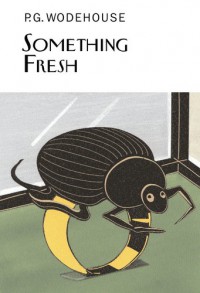 This is probably my favorite Wodehouse book. There is something refreshing, cleansing, and joyful about reading this book. Laughter is a great healer, and this book is top on my list of remedies. Especially the section where three men collide, quite literally, and provide the scenario that never fails to make me laugh aloud. The Efficient Baxter, a man in love bringing a midnight snack of cold tongue to his beloved, and a valet sworn to pinch a priceless scarab from the Blandings museum -- all brought together in perfect harmony as can only be done by Wodehouse.
This is probably my favorite Wodehouse book. There is something refreshing, cleansing, and joyful about reading this book. Laughter is a great healer, and this book is top on my list of remedies. Especially the section where three men collide, quite literally, and provide the scenario that never fails to make me laugh aloud. The Efficient Baxter, a man in love bringing a midnight snack of cold tongue to his beloved, and a valet sworn to pinch a priceless scarab from the Blandings museum -- all brought together in perfect harmony as can only be done by Wodehouse.
Wherever I Wind Up: My Quest for Truth, Authenticity and the Perfect Knuckleball
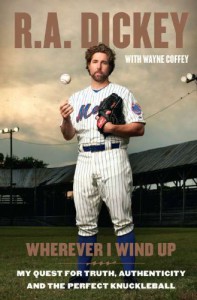 I had always wanted to know what a knuckleball was, and why not that many pitchers throw them. This book was worthwhile in explaining that. It is kind of a "spiritual discipline via the knuckleball" approach to life.The book is not terribly well written, however R.A.'s life is interesting and he shows great perseverance against great odds and many setbacks. The section where he swims (or tries to swim) across the Missouri River was fascinating. He goes into the river arrogant and sure of his ability to swim the river. He struggles in the river and almost drowns. When he emerges, he has a renewed thankfulness for being alive. It changes his attitude quite literally, and interestingly enough his pitching is transformed as well.
I had always wanted to know what a knuckleball was, and why not that many pitchers throw them. This book was worthwhile in explaining that. It is kind of a "spiritual discipline via the knuckleball" approach to life.The book is not terribly well written, however R.A.'s life is interesting and he shows great perseverance against great odds and many setbacks. The section where he swims (or tries to swim) across the Missouri River was fascinating. He goes into the river arrogant and sure of his ability to swim the river. He struggles in the river and almost drowns. When he emerges, he has a renewed thankfulness for being alive. It changes his attitude quite literally, and interestingly enough his pitching is transformed as well.
iWoz: Computer Geek to Cult Icon: How I Invented the Personal Computer, Co-Founded Apple, and Had Fun Doing It
 This is book is very worthwhile to read... but perhaps for not the most obvious reasons. It is not well written. Understanding Steve Wozniak's distrust of people who tell the story of the founding of Apple and get it wrong, I think he decided to write this book himself and not trust anyone who might twist it into something else. He is an engineer, in the truest and best sense, and he is an introvert. These things come out in the book, and make it a much different read perhaps than might be expected. Don't expect emotional misty eyed passages as Woz and Steve Jobs create Apple.... expect the nuts and bolts of things an engineer finds fascinating. He corrects some wrong information out there about Apple and himself. One correction, he did finish college. It has been reported widely that he dropped out and never got a college degree. That's wrong. Another correction, he designed and built both the Apple I and Apple II computers himself without help. Also, he never quit Apple out of anger or bitterness. He did leave Apple to start another company, but he actually is still an Apple employee.So read it in the interest of finding out the accurate history, from a man who was there and made it happen.One of my favorite quotes from the back of the book that made me laugh is one from Guy Kawasaki who wrote "The Art of the Start and Rules for Revolutionaries" :"It is, in a nutshell, the engineer's manifesto. I hope that the so-called 'innovation experts' and MBA's choke when they read it."
This is book is very worthwhile to read... but perhaps for not the most obvious reasons. It is not well written. Understanding Steve Wozniak's distrust of people who tell the story of the founding of Apple and get it wrong, I think he decided to write this book himself and not trust anyone who might twist it into something else. He is an engineer, in the truest and best sense, and he is an introvert. These things come out in the book, and make it a much different read perhaps than might be expected. Don't expect emotional misty eyed passages as Woz and Steve Jobs create Apple.... expect the nuts and bolts of things an engineer finds fascinating. He corrects some wrong information out there about Apple and himself. One correction, he did finish college. It has been reported widely that he dropped out and never got a college degree. That's wrong. Another correction, he designed and built both the Apple I and Apple II computers himself without help. Also, he never quit Apple out of anger or bitterness. He did leave Apple to start another company, but he actually is still an Apple employee.So read it in the interest of finding out the accurate history, from a man who was there and made it happen.One of my favorite quotes from the back of the book that made me laugh is one from Guy Kawasaki who wrote "The Art of the Start and Rules for Revolutionaries" :"It is, in a nutshell, the engineer's manifesto. I hope that the so-called 'innovation experts' and MBA's choke when they read it."
How to Read Slowly (Wheaton Literary)
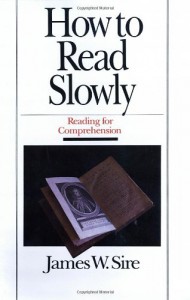 Looks like "How to Read A Book" by Mortimer Adler which we have been using for several terms in school. I look forward to how they compare.
Looks like "How to Read A Book" by Mortimer Adler which we have been using for several terms in school. I look forward to how they compare.
Jacqueline Kennedy: Historic Conversations on Life with John F. Kennedy
 I got this from the library and amazingly enough, it is a transcript of the actual interviews that Jacqueline Kennedy gave to Arthur Schlesinger in 1964, a mere 4 months after JFK had been killed, and then a set of CD's of those very interviews. I am reading the interviews now, and probably will listen to a few of the CD's.*************Worthwhile reading. Interesting to hear Jackie's "take" on many issues that mostly encompassed JFK's political life as senator of Massachusetts to the presidency. Even more interesting to hear her likes and dislikes of different people. Some sweet moment in listening to the CD were when John, her youngest son, would come into the room and either talk or play with the tape recorder. At one point Schlesinger asks John where his Daddy is, and John replies, "In heaven". That part almost made me weep.
I got this from the library and amazingly enough, it is a transcript of the actual interviews that Jacqueline Kennedy gave to Arthur Schlesinger in 1964, a mere 4 months after JFK had been killed, and then a set of CD's of those very interviews. I am reading the interviews now, and probably will listen to a few of the CD's.*************Worthwhile reading. Interesting to hear Jackie's "take" on many issues that mostly encompassed JFK's political life as senator of Massachusetts to the presidency. Even more interesting to hear her likes and dislikes of different people. Some sweet moment in listening to the CD were when John, her youngest son, would come into the room and either talk or play with the tape recorder. At one point Schlesinger asks John where his Daddy is, and John replies, "In heaven". That part almost made me weep.
The Dance of Fear: Rising Above Anxiety, Fear, and Shame to Be Your Best and Bravest Self
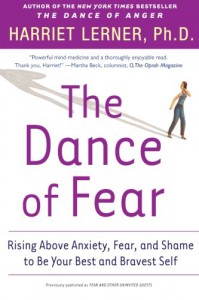 I'm on a roll here for books on communication and dealing with emotionally fearful or anxious situations regarding family / work / friends. I just read Lerner's book "The Dance of Connection" about how to talk with someone when you are hurt or scared or desperate. Both books are worth reading. This book on fear had an interesting section on how organizations and work groups can react just like an individual person reacts when they become frightened. She lists five styles of managing anxiety:1) Underfunctioning -- doing less than you are supposed to do, a typical family underfunctioner (is that a word?) is the youngest of multiple siblings.The solution to underfunctioning? take responsibility!2) Blaming -- removing the focus from you to another personThe solution? think through your reaction to blame and stop to think and accept the part of the situation that is yours to own before naming and blaming someone else.3) Distancing --removing yourself from the uncomfortable and anxious situation, disappearing from those situations completely.The solution? Hang out rather than hide out, and stay present and be direct4) Gossip! Gossip! Gossip!The solution? Be straighforward!5) Overfunctioning -- doing too much, this is the"natural province of the firstborn, who tend to think they know what is best not only for themselves but for everyone else on the planet." The solution? Know when to stop!It was interesting after reading this section on managing anxiety to think think of how different work groups or volunteer organizations can act in the similar way and "shed" anxiety using the same types of styles.
I'm on a roll here for books on communication and dealing with emotionally fearful or anxious situations regarding family / work / friends. I just read Lerner's book "The Dance of Connection" about how to talk with someone when you are hurt or scared or desperate. Both books are worth reading. This book on fear had an interesting section on how organizations and work groups can react just like an individual person reacts when they become frightened. She lists five styles of managing anxiety:1) Underfunctioning -- doing less than you are supposed to do, a typical family underfunctioner (is that a word?) is the youngest of multiple siblings.The solution to underfunctioning? take responsibility!2) Blaming -- removing the focus from you to another personThe solution? think through your reaction to blame and stop to think and accept the part of the situation that is yours to own before naming and blaming someone else.3) Distancing --removing yourself from the uncomfortable and anxious situation, disappearing from those situations completely.The solution? Hang out rather than hide out, and stay present and be direct4) Gossip! Gossip! Gossip!The solution? Be straighforward!5) Overfunctioning -- doing too much, this is the"natural province of the firstborn, who tend to think they know what is best not only for themselves but for everyone else on the planet." The solution? Know when to stop!It was interesting after reading this section on managing anxiety to think think of how different work groups or volunteer organizations can act in the similar way and "shed" anxiety using the same types of styles.
Thriving at College: Make Great Friends, Keep Your Faith, and Get Ready for the Real World!
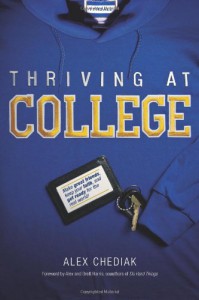 I think this would be very worthwhile reading for pre-college students.... perhaps in early high school! Many of the ideas about time management, learning to be independent of your parents (in a healthy way), and being thoughtful and careful in your thoughts and actions apply equally to younger students.Would recommend this book highly.
I think this would be very worthwhile reading for pre-college students.... perhaps in early high school! Many of the ideas about time management, learning to be independent of your parents (in a healthy way), and being thoughtful and careful in your thoughts and actions apply equally to younger students.Would recommend this book highly.
The Story of English in 100 Words
 If you love the interplay of words and researching where they came from, you'd enjoy this book. I know I did!
If you love the interplay of words and researching where they came from, you'd enjoy this book. I know I did!
Answers for Difficult Days: Surviving the Storm of Secularism
 This short little booklet is meant to be used by the reader as a springboard for thought regarding 7 important questions:1) Is there a God?2) What is the Origin of the Universe?3) What is the nature of man?4) What is the basis of ethics and morality?5) What is the cause of evil and suffering?6) What happens to man at death?7) What is the meaning of history?Each section has a brief introduction, then questions and places to write down your answers to those questions. Worthwhile for study and contemplation.
This short little booklet is meant to be used by the reader as a springboard for thought regarding 7 important questions:1) Is there a God?2) What is the Origin of the Universe?3) What is the nature of man?4) What is the basis of ethics and morality?5) What is the cause of evil and suffering?6) What happens to man at death?7) What is the meaning of history?Each section has a brief introduction, then questions and places to write down your answers to those questions. Worthwhile for study and contemplation.
The Mating Season
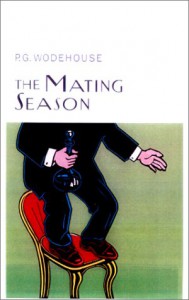 Again, joy and laughter at every corner in this book. Jeeves with the cosh. Corky with her dog Sam Goldwyn. Bertie masquerading as as Gussie, Gussie masquerading as Bertie. The village concert, my favorite performer being Master George Keggley-Bassington who recites "Ben Battle" (see http://www.poemhunter.com/poem/faithless-nelly-gray/ ). So many things to love and enjoy!We read part of this and listened to the rest in the car. I highly recommend the book, and highly recommend Jonathan Cecil's reading.
Again, joy and laughter at every corner in this book. Jeeves with the cosh. Corky with her dog Sam Goldwyn. Bertie masquerading as as Gussie, Gussie masquerading as Bertie. The village concert, my favorite performer being Master George Keggley-Bassington who recites "Ben Battle" (see http://www.poemhunter.com/poem/faithless-nelly-gray/ ). So many things to love and enjoy!We read part of this and listened to the rest in the car. I highly recommend the book, and highly recommend Jonathan Cecil's reading.


